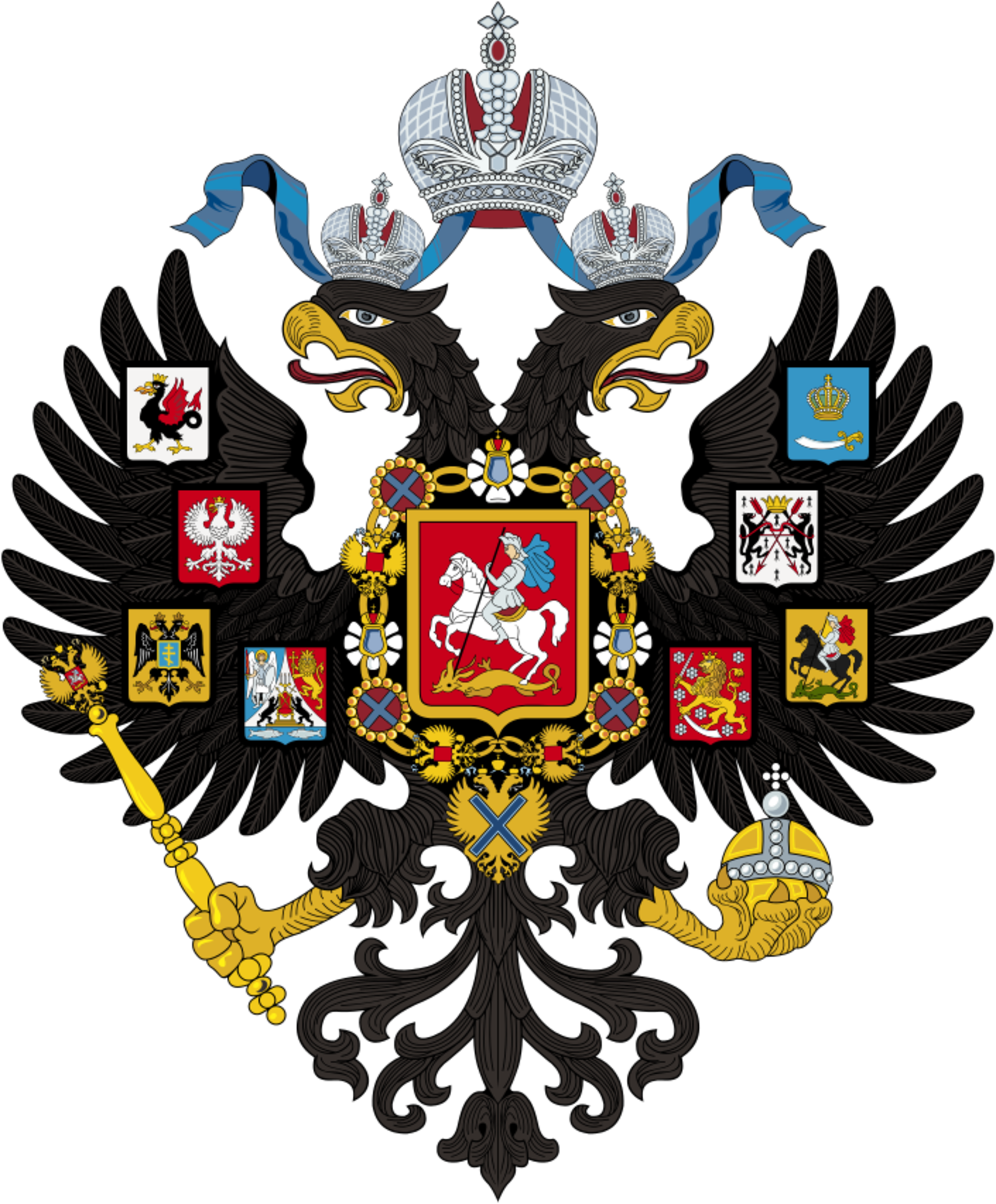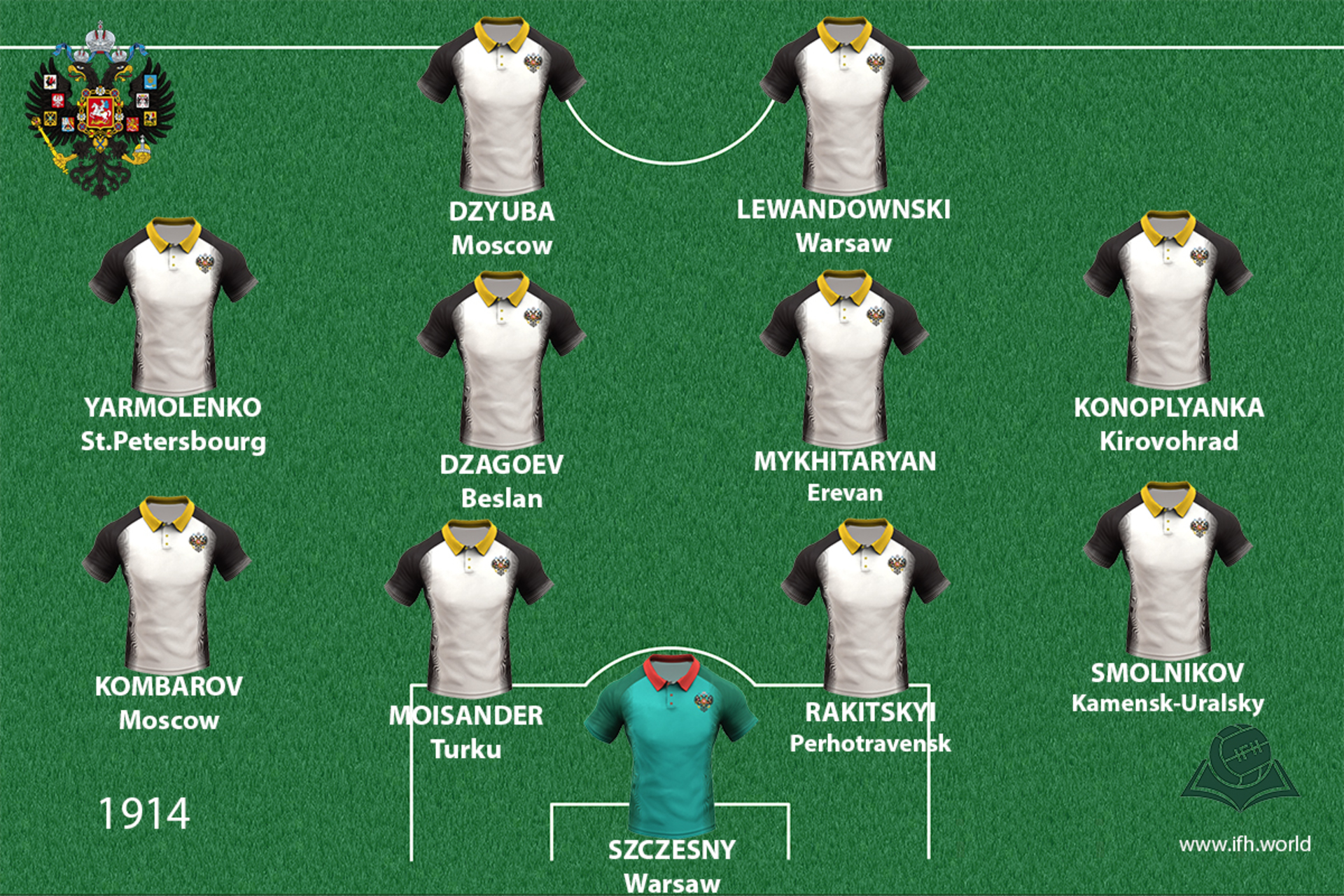Russian Empire
In an era of increasing prestige of the idea of a nation, under the Romans the identification of Russian and Orthodox was theoretically absolute. As tsarism took on a Russifying nationalist form, it led to the creation of numerous nationalist movements, among which the demands for autonomy and for language and culture (Poles, Ukrainians, Finns, etc.) coincided.

Coat of arms
Shirt
| Position | First name | Last name | Mjesto rođenja | Like | Dislike | |
|---|---|---|---|---|---|---|
| GK | Igor | AKINFEEV | Vidnoye |
15 |
4 |
|
| GK | Wojciech | SZCZESNY | Warsaw |
19 |
1 |
|
| DC | Guram | KASHIA | Tbilisi |
3 |
2 |
|
| DC | Niklas | MOISANDER | Turku |
0 |
0 |
|
| DC | Yevhen | KHACHERIDI | Melitopol |
1 |
0 |
|
| DLC | Ragnar | KLAVAN | Viljandi |
4 |
0 |
|
| DLC | Yaroslav | RAKITSKY | Pershotravensk |
5 |
0 |
|
| DRL/MR | Igor | SMOLNIKOV | Kamensk-Uralsky |
4 |
1 |
|
| DR | Andreas | BECK | Kemerovo |
2 |
1 |
|
| DL/ML | Georgi | SCHENNIKOV | Moscow |
6 |
4 |
|
| DC/DMC | Roman | NEUSTADTER | Dnipropetrovsk |
2 |
1 |
|
| DMC | Taras | STEPANENKO | Velyka Novosilka |
3 |
1 |
|
| MC | Aleksandr | GOLOVIN | Kaltan |
5 |
0 |
|
| MC | Aleksey | MIRANCHUK | Slavyansk-na-Kubani |
4 |
1 |
|
| MC | Denis | GLUSHAKOV | Millerovo |
1 |
2 |
|
| ML/DL | Dmitri | KOMBAROV | Moscow |
4 |
4 |
|
| MRLC | Oleg | SHATOV | Nizhny Tagil |
2 |
2 |
|
| AMC | Alan | DZAGOEV | Beslan |
3 |
0 |
|
| AMC | Henrikh | MYKHITARYAN | Erevan |
4 |
0 |
|
| AMRLC | Viktor | KOVALENKO | Kherson |
3 |
0 |
|
| AMRL | Denis | CHERYSHEV | Nizhny Novgorod |
10 |
1 |
|
| AMRL | Yehven | KONOPLYANKA | Kirovohrad |
5 |
0 |
|
| FRLC | Dmitri | POLOZ | Stavropol |
2 |
0 |
|
| FRLC | Fyodor | SMOLOV | Saratov |
4 |
1 |
|
| FC | Robert | LEWANDOWSKI | Warsaw |
21 |
1 |
|
| FC/SS | Aleksandr | KOKORIN | Valuyki |
3 |
0 |
|
| FC/SS | Artyom | DZYUBA | Moscow |
9 |
1 |
|
| FC/SS | Teemu | PUKKI | Kotka |
3 |
0 |
|
| AMRL/DL | Oleksandr | ZINCHENKO | Radomyshl |
19 |
1 |
Along with glorifying liberation from Tatars, Moscow as the "Third Rome", Russian national ideologues, like everyone else in Europe, became obsessed with continuity and, in the struggle with Ukrainian ideologues, began to conquer medieval Kievan Rus as the predecessor of imperial Russia. While the Russians claim that it is the first Russian state and the Moscow principality its direct successor, it is beyond doubt for Ukrainians that it is a testament to the millennial tradition of Ukrainian statehood. Despite the success of building the Trans-Siberian Railway (1903), which transformed Russia from a former granary for British companies into a potentially modern industrial country, in the early 20th century. Russia was in a chaotic situation. The peasant had no secured peaceful existence, workers' rights were reduced to a minimum more than anywhere else, the army was disgraced in the war with Japan in 1905, etc.
Ultimately, all this will result in the revolution of 1905, when a series of unsuccessful, and bloody, street riots, strikes and peasant uprisings erupt in the domino effect. Russia was successfully expanding eastward, where it encountered no organized resistance but mainly deserted areas inhabited by various nomadic peoples. In the west, however, dissatisfaction with German and Austro-Hungarian penetration into Southeastern Europe and the cooperation of the Ottomans and Germany brought Russia closer to Britain, which had hitherto prevented it from expanding its policy towards the Bosporus and the Dardanelles. While the link between France and Russia was already achieved between 1891 and 1894 by signing a series of co-operation agreements.
Sources
- William F. ENGDAHL, Stoljeće rata : anglo-američka naftna politika i novi svjetski poredak, Zagreb, 2008.
- Felipe FERNANDEZ-ARMESTO, Narodi Europe, Zagreb, 1997.
- Grupa autora, Povijest: Kolonijalna carstva i imperijalizam (1871- 1914.), knjiga V.I., Zagreb 2008.
- Eric J. HOBSBAWM, Nacije i nacionalizam, Zagreb, 1993.
- D.MARJANOVIĆ, ''100 godina nakon atentata u Sarajevu - Gavrilo Princip i hitac koji je promijenio svijet: o povijesnom kontekstu, Jugoslavenstvu, revoluciji, terorizmu i sudbini naroda'',
- http://www.advance.hr/vijesti/100-godina-nakon-atentata-u-sarajevu-gavrilo-princip-i-hitac-koji-je-promijenio-svijet-o-povijesnom-kontekstu-jugoslavenstvu-revoluciji-terorizmu-i-sudbini-naroda/
- ''Russian nationalism'', https://en.wikipedia.org/wiki/Russian_nationalism
- Taras KUZLO, ''Theoretical and Comparative Perspectives on Nationalism
- https://books.google.hr/books?id=sVoxBgAAQBAJ&pg=PA322&lpg=PA322&dq=nationalism+between+kiev+rus&source=bl&ots=3YGtAsGzM4&sig=buVNFu5yIQvQZK5H4otV5amsCpc&hl=hr&sa=X&ved=0ahUKEwi45rrZiZDKAhXCFw8KHee3DqUQ6AEILDAD#v=onepage&q=nationalism%20between%20kiev%20rus&f=false
- Robert SERVICE, Povijest suvremene Rusije, Zagreb, 2014
- Coat of arms: https://en.wikipedia.org/wiki/Coat_of_arms_of_Russia
